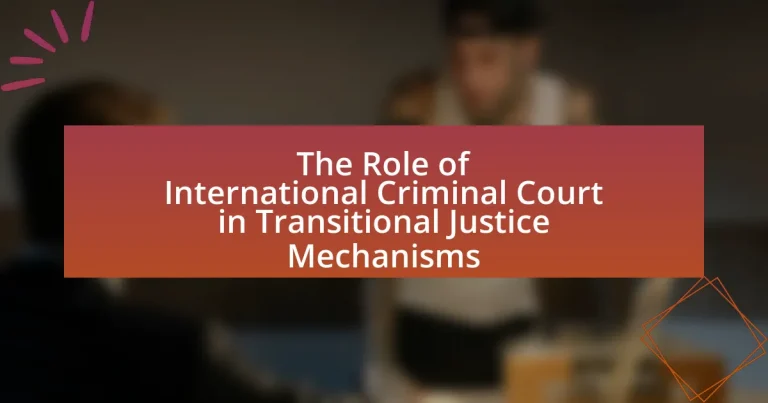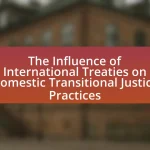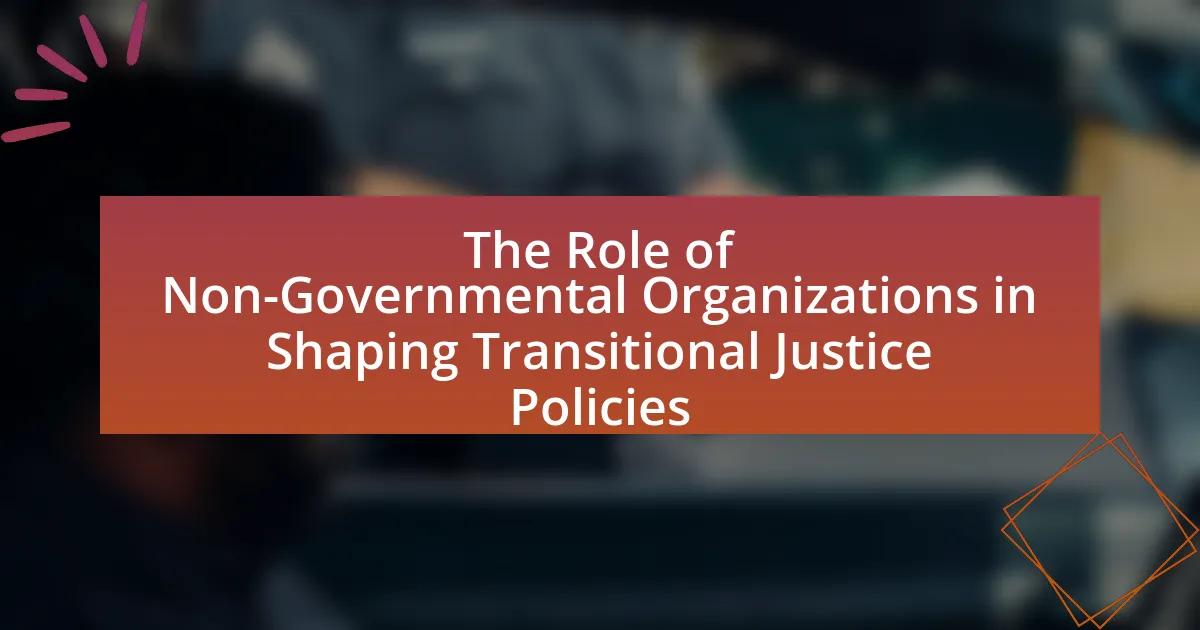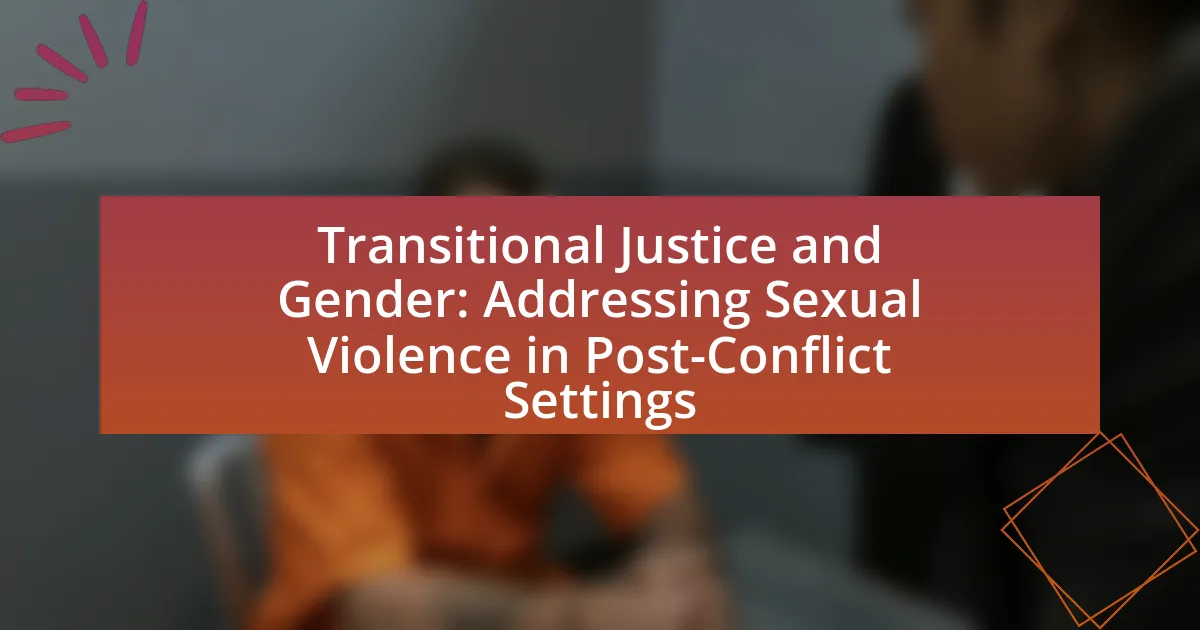The International Criminal Court (ICC) is a permanent international tribunal established in 2002 to prosecute individuals for serious crimes such as genocide, war crimes, and crimes against humanity. The ICC plays a vital role in transitional justice mechanisms by promoting accountability, deterring future atrocities, and fostering reconciliation in post-conflict societies. Key principles guiding the ICC’s operations include complementarity, gravity, and individual criminal responsibility, which ensure that national jurisdictions are prioritized while addressing severe violations. The court’s interactions with national legal systems and its focus on victims’ rights further enhance its effectiveness in delivering justice and supporting the rebuilding of affected communities. However, challenges such as state cooperation, limited jurisdiction, and political influences continue to impact the ICC’s ability to fulfill its mandate in transitional justice.
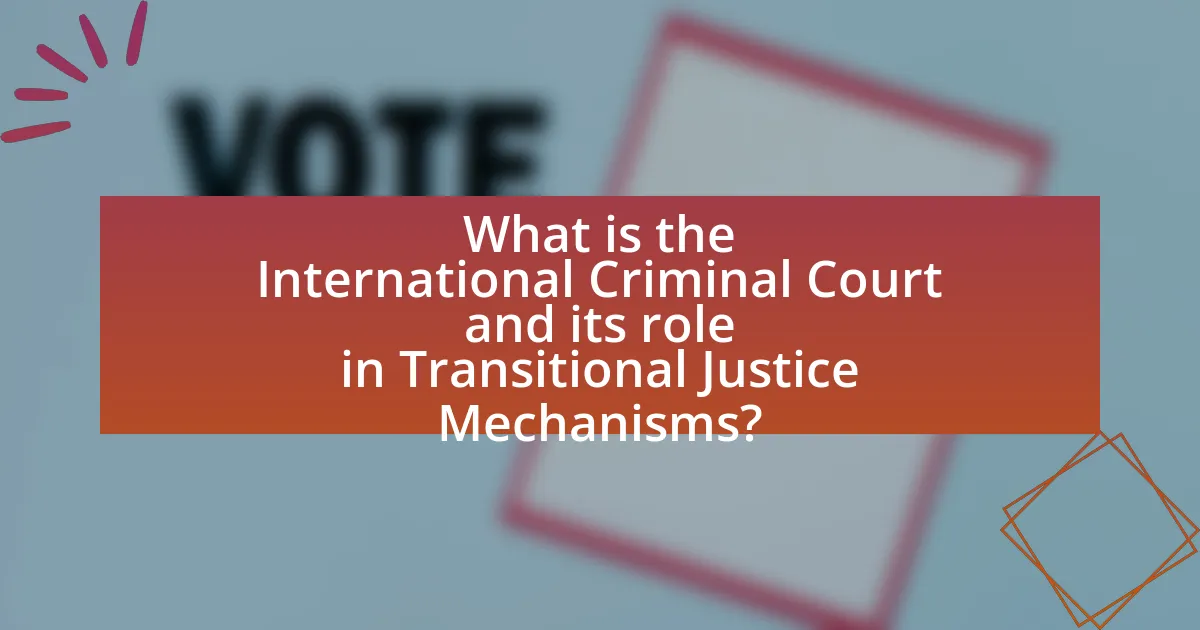
What is the International Criminal Court and its role in Transitional Justice Mechanisms?
The International Criminal Court (ICC) is a permanent international tribunal established in 2002 to prosecute individuals for crimes such as genocide, war crimes, and crimes against humanity. The ICC plays a crucial role in transitional justice mechanisms by holding perpetrators accountable, thereby promoting accountability and deterring future crimes. This accountability is essential for societies emerging from conflict or authoritarian rule, as it helps to restore trust in institutions and fosters reconciliation. The ICC’s involvement in transitional justice is evidenced by its investigations and prosecutions in various countries, such as the Democratic Republic of the Congo and Sudan, which aim to address past atrocities and support the rebuilding of affected communities.
How does the International Criminal Court function within the framework of Transitional Justice?
The International Criminal Court (ICC) functions within the framework of Transitional Justice by prosecuting individuals for serious crimes such as genocide, war crimes, and crimes against humanity, thereby promoting accountability and deterring future atrocities. The ICC complements national justice systems by addressing impunity in post-conflict societies, which is essential for reconciliation and rebuilding trust among communities. For instance, the ICC’s involvement in situations like the Democratic Republic of the Congo has highlighted the importance of international legal standards in transitional contexts, reinforcing the principle that perpetrators of egregious crimes should face justice regardless of their position or power. This approach not only seeks to deliver justice for victims but also aims to contribute to the establishment of the rule of law in societies emerging from conflict.
What are the key principles guiding the International Criminal Court’s operations?
The key principles guiding the International Criminal Court’s operations are complementarity, gravity, and the principle of individual criminal responsibility. Complementarity ensures that the ICC acts only when national jurisdictions are unwilling or unable to prosecute serious crimes, thereby respecting state sovereignty. Gravity refers to the seriousness of the crimes under the Court’s jurisdiction, which include genocide, war crimes, and crimes against humanity, ensuring that the ICC focuses on the most severe violations. The principle of individual criminal responsibility holds individuals accountable for their actions, emphasizing that leaders and perpetrators cannot evade justice by claiming they acted on orders or as part of a group. These principles are enshrined in the Rome Statute, the founding treaty of the ICC, which was adopted in 1998 and came into force in 2002.
How does the International Criminal Court interact with national legal systems?
The International Criminal Court (ICC) interacts with national legal systems primarily through the principle of complementarity, which allows the ICC to prosecute cases only when national jurisdictions are unwilling or unable to do so. This principle is enshrined in the Rome Statute, the ICC’s founding treaty, which emphasizes that states have the primary responsibility to investigate and prosecute crimes such as genocide, war crimes, and crimes against humanity.
When a situation is referred to the ICC, the Court assesses whether the national legal system is genuinely pursuing accountability. If a state is actively investigating or prosecuting individuals for the same crimes, the ICC will defer to that national process. Conversely, if a state fails to act, the ICC can step in to ensure justice is served. This interaction is further reinforced by the ICC’s cooperation with national authorities, which includes sharing evidence and legal assistance to support domestic prosecutions.
The effectiveness of this interaction is evident in cases where national courts have successfully prosecuted individuals for international crimes, thereby fulfilling their obligations under international law while allowing the ICC to focus on cases where national systems are inadequate.
Why is the International Criminal Court important for post-conflict societies?
The International Criminal Court (ICC) is important for post-conflict societies because it provides a mechanism for accountability and justice for war crimes, genocide, and crimes against humanity. By prosecuting individuals responsible for such atrocities, the ICC helps to deter future violence and fosters a sense of justice among victims and affected communities. Historical evidence shows that the establishment of the ICC has contributed to the promotion of the rule of law and the strengthening of national judicial systems in countries emerging from conflict, as seen in the cases of Uganda and the Democratic Republic of the Congo. This accountability mechanism not only addresses past grievances but also supports reconciliation efforts, thereby aiding in the stabilization and rebuilding of post-conflict societies.
What impact does the International Criminal Court have on accountability for war crimes?
The International Criminal Court (ICC) significantly enhances accountability for war crimes by providing a legal framework for prosecuting individuals responsible for such offenses. Established by the Rome Statute in 2002, the ICC serves as a permanent tribunal that addresses serious international crimes, including war crimes, genocide, and crimes against humanity. The court’s ability to investigate and prosecute these crimes promotes deterrence, as potential perpetrators recognize the risk of facing justice.
Moreover, the ICC’s involvement in various cases, such as the prosecution of leaders from the Democratic Republic of the Congo and Sudan, demonstrates its role in holding individuals accountable and reinforcing the principle that no one is above the law. The court also encourages national jurisdictions to pursue accountability by setting precedents and providing support for domestic legal systems. This dual approach fosters a culture of accountability and contributes to the broader goals of transitional justice, which seeks to address past atrocities and promote reconciliation.
How does the International Criminal Court contribute to reconciliation processes?
The International Criminal Court (ICC) contributes to reconciliation processes by holding perpetrators of serious crimes accountable, thereby promoting justice and deterring future violations. By prosecuting individuals for war crimes, genocide, and crimes against humanity, the ICC helps to establish a historical record of events, which is crucial for collective memory and acknowledgment of victims’ suffering. This accountability fosters trust in legal institutions and encourages societies to confront their past, which is essential for healing and rebuilding relationships among communities. Furthermore, the ICC’s involvement can catalyze national dialogues and support local reconciliation efforts, as seen in cases like the Democratic Republic of the Congo, where ICC actions have prompted discussions on justice and peace.
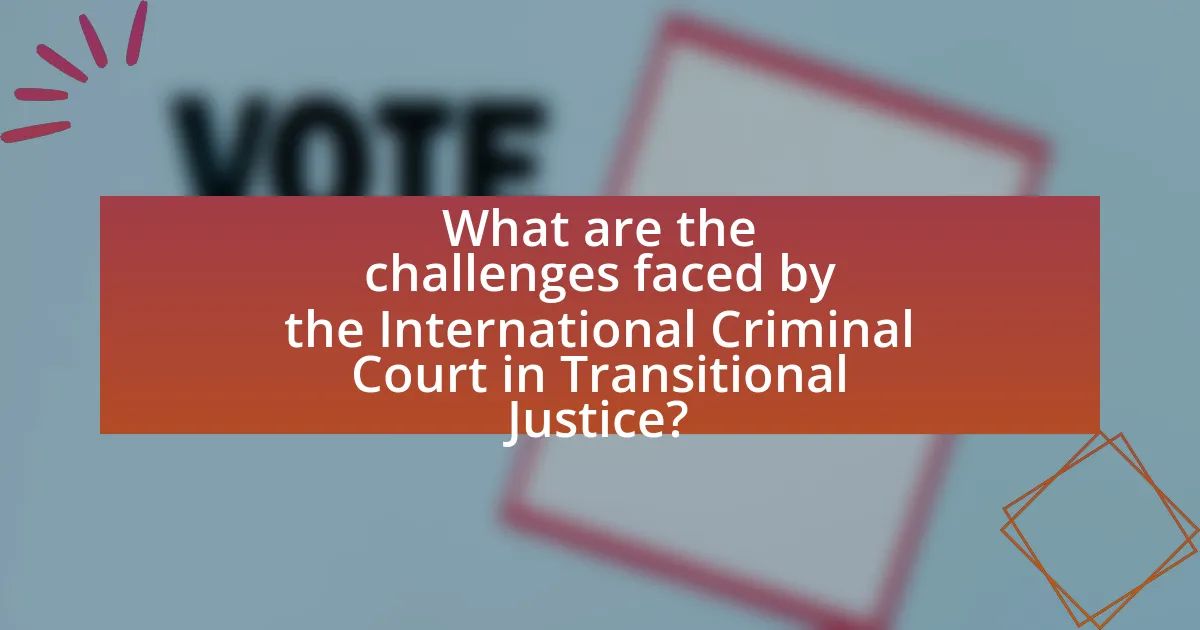
What are the challenges faced by the International Criminal Court in Transitional Justice?
The International Criminal Court (ICC) faces several challenges in transitional justice, primarily including issues of state cooperation, limited jurisdiction, and political influence. State cooperation is crucial for the ICC to execute arrest warrants and gather evidence, yet many countries are reluctant to comply, undermining the court’s effectiveness. Limited jurisdiction restricts the ICC to prosecuting crimes committed in member states or by nationals of member states, which can exclude significant cases of atrocities occurring elsewhere. Additionally, political influence often affects the ICC’s operations, as powerful nations may manipulate proceedings or refuse to support investigations that implicate their allies. These challenges hinder the ICC’s ability to deliver justice and accountability in transitional contexts.
What obstacles hinder the effectiveness of the International Criminal Court?
The effectiveness of the International Criminal Court (ICC) is hindered by several key obstacles, including limited jurisdiction, lack of cooperation from states, and political influence. Limited jurisdiction restricts the ICC’s ability to prosecute crimes only in member states or those referred by the United Nations Security Council, which excludes many situations of mass atrocities. Additionally, the ICC often faces challenges in securing cooperation from states for arrests and evidence, as seen in cases like Sudan’s Omar al-Bashir, who has evaded arrest despite ICC warrants. Political influence also affects the ICC’s operations, as powerful nations may resist accountability for their actions or those of their allies, undermining the court’s impartiality and effectiveness. These factors collectively impede the ICC’s mission to deliver justice and deter future crimes.
How do political influences affect the International Criminal Court’s decisions?
Political influences significantly affect the International Criminal Court’s decisions by shaping the prosecution priorities and influencing the court’s legitimacy. For instance, the ICC often faces pressure from powerful states that may either support or oppose investigations based on their geopolitical interests, which can lead to selective justice. A notable example is the reluctance of the ICC to pursue cases against leaders from countries with strong political ties to influential member states, as seen in the cases involving the United States and its allies. This dynamic illustrates how political considerations can hinder the court’s ability to act impartially and uphold its mandate to prosecute war crimes and crimes against humanity.
What are the limitations of the International Criminal Court’s jurisdiction?
The International Criminal Court (ICC) has several limitations in its jurisdiction, primarily defined by the principle of complementarity, which allows national courts to prosecute crimes before the ICC intervenes. The ICC can only prosecute individuals for crimes committed in the territory of a state party or by a national of a state party, as established by the Rome Statute. Additionally, the ICC lacks jurisdiction over crimes committed before its establishment in 2002, and it cannot prosecute non-member states unless they accept its jurisdiction or the United Nations Security Council refers a case. These limitations restrict the ICC’s ability to address all international crimes comprehensively, as evidenced by cases where national courts have chosen not to prosecute, leaving gaps in accountability.
How does the International Criminal Court address victims’ rights in Transitional Justice?
The International Criminal Court (ICC) addresses victims’ rights in Transitional Justice by incorporating provisions that allow victims to participate in proceedings and seek reparations. The Rome Statute, which established the ICC, explicitly recognizes the rights of victims to present their views and concerns during trials, ensuring their voices are heard in the judicial process. Additionally, the ICC has established a Trust Fund for Victims, which provides support for rehabilitation and compensation to those affected by crimes under its jurisdiction. This framework not only emphasizes the importance of victim participation but also aims to restore dignity and provide justice to individuals impacted by serious crimes, thereby reinforcing the ICC’s commitment to upholding victims’ rights within the broader context of Transitional Justice.
What mechanisms are in place for victim participation in the International Criminal Court?
The International Criminal Court (ICC) has established several mechanisms for victim participation, primarily through the legal framework outlined in the Rome Statute. Victims can participate in proceedings by submitting applications to be recognized as victims, which allows them to present their views and concerns during trials. Additionally, the ICC provides for the appointment of legal representatives for victims, ensuring that their interests are adequately represented in court.
The Court also allows victims to submit evidence and make statements, contributing to the overall judicial process. This participatory approach is reinforced by the ICC’s commitment to ensuring that victims have access to reparations, as stipulated in Article 75 of the Rome Statute, which emphasizes the importance of addressing the harm suffered by victims. These mechanisms collectively enhance the role of victims in the judicial process, promoting their rights and involvement in transitional justice.
How does the International Criminal Court ensure reparations for victims?
The International Criminal Court (ICC) ensures reparations for victims through its legal framework established in the Rome Statute, specifically Article 75, which allows for the establishment of a trust fund for victims. This trust fund is designed to provide physical, psychological, and material support to victims of crimes under the Court’s jurisdiction. The ICC also mandates that reparations be ordered as part of its judgments, ensuring that convicted individuals are held accountable for their actions. Furthermore, the Court collaborates with various stakeholders, including states and non-governmental organizations, to facilitate the implementation of reparations and support for victims.
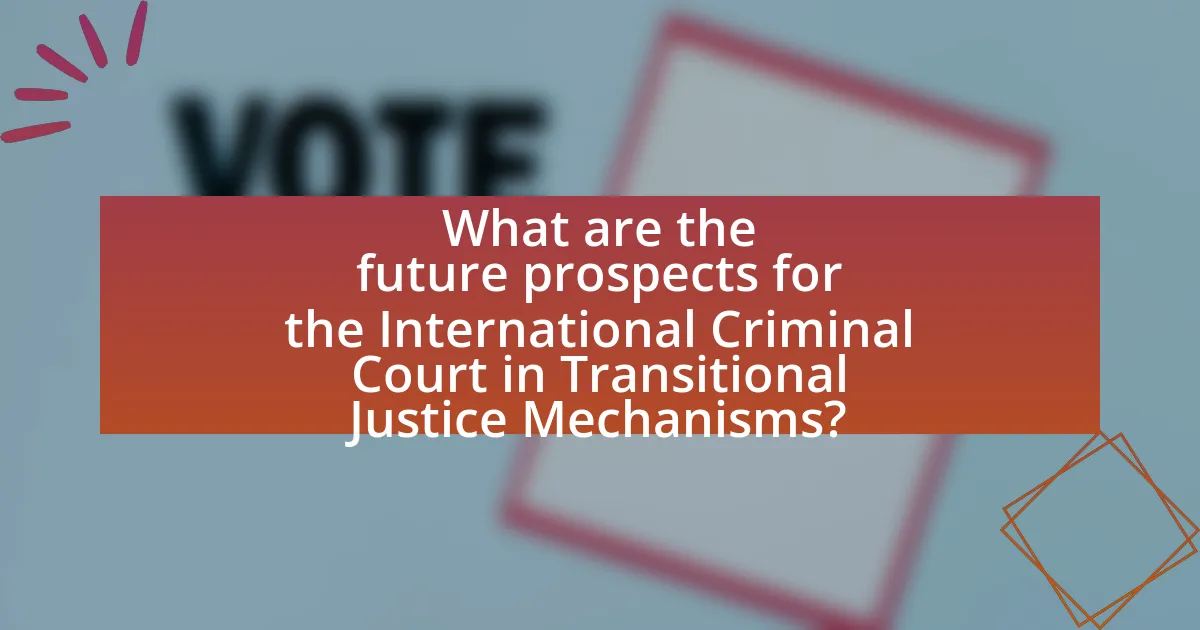
What are the future prospects for the International Criminal Court in Transitional Justice Mechanisms?
The future prospects for the International Criminal Court (ICC) in transitional justice mechanisms are promising, as the ICC continues to evolve in its role of addressing accountability for serious crimes. The ICC’s ability to prosecute individuals for war crimes, genocide, and crimes against humanity enhances its relevance in transitional justice, particularly in post-conflict societies seeking to rebuild and reconcile. The court’s recent focus on complementarity, encouraging national jurisdictions to take on cases, indicates a shift towards collaborative justice efforts. Furthermore, the ICC’s engagement with local communities and integration of victim participation in proceedings strengthens its legitimacy and effectiveness. These developments suggest that the ICC will play an increasingly vital role in shaping transitional justice frameworks globally, as evidenced by its involvement in cases from countries like Uganda and the Democratic Republic of the Congo, where it has contributed to broader justice initiatives.
How can the International Criminal Court enhance its role in future Transitional Justice efforts?
The International Criminal Court (ICC) can enhance its role in future Transitional Justice efforts by increasing collaboration with local jurisdictions and civil society organizations. This approach allows the ICC to better understand the specific needs and contexts of affected communities, thereby tailoring its interventions to support local justice mechanisms effectively. For instance, the ICC’s outreach programs have previously demonstrated that engaging with local populations fosters trust and encourages participation in justice processes, as seen in the cases from the Democratic Republic of the Congo. By prioritizing partnerships and integrating local perspectives, the ICC can strengthen its impact on transitional justice initiatives and promote sustainable peace.
What reforms could improve the International Criminal Court’s effectiveness?
Reforms that could improve the International Criminal Court’s effectiveness include enhancing cooperation with member states, increasing funding and resources, and streamlining case procedures. Enhanced cooperation with member states is crucial, as it can lead to better arrest warrants and support for investigations; for instance, the ICC has faced challenges in executing arrest warrants due to lack of cooperation from states. Increasing funding and resources would allow the ICC to expand its investigative capabilities and legal support, addressing the backlog of cases; the court’s budget has historically been limited, impacting its operational efficiency. Streamlining case procedures can reduce delays in trials, which have been a significant issue, as seen in the lengthy trials of high-profile cases that undermine timely justice. These reforms collectively aim to strengthen the ICC’s ability to fulfill its mandate effectively.
How can the International Criminal Court foster greater international cooperation?
The International Criminal Court (ICC) can foster greater international cooperation by enhancing its engagement with member states and non-member states through diplomatic initiatives and capacity-building programs. By facilitating dialogue and collaboration on issues of international justice, the ICC encourages states to share best practices and resources, which strengthens their commitment to accountability for crimes such as genocide and war crimes. For instance, the ICC’s outreach programs have successfully increased awareness and support for its mandate, leading to improved cooperation from states in arresting fugitives and providing evidence. This collaborative approach not only reinforces the ICC’s authority but also promotes a collective responsibility among nations to uphold international law.
What best practices can be adopted for effective collaboration with the International Criminal Court?
Effective collaboration with the International Criminal Court (ICC) can be achieved through several best practices, including establishing clear communication channels, ensuring timely information sharing, and fostering mutual respect among stakeholders. Clear communication channels facilitate the exchange of critical information, which is essential for the ICC’s investigations and prosecutions. Timely information sharing allows for the swift collection of evidence and testimonies, enhancing the effectiveness of legal proceedings. Additionally, fostering mutual respect among national authorities, civil society, and the ICC promotes a collaborative environment, which is crucial for the success of transitional justice mechanisms. These practices are supported by the ICC’s emphasis on cooperation with states and organizations, as outlined in the Rome Statute, which underscores the importance of collaboration in achieving justice and accountability.
How can local communities engage with the International Criminal Court for better outcomes?
Local communities can engage with the International Criminal Court (ICC) for better outcomes by actively participating in the court’s processes, such as submitting information, providing testimonies, and advocating for justice. This engagement can enhance the ICC’s understanding of local contexts and the specific needs of affected populations, thereby improving the relevance and effectiveness of its interventions. For instance, the ICC has mechanisms for victims to participate in proceedings, which allows local communities to voice their experiences and influence the court’s decisions. Additionally, community organizations can collaborate with the ICC to raise awareness about international justice and mobilize support for accountability efforts, as seen in various cases where local advocacy has led to increased attention on specific crimes.
What strategies can enhance the visibility and support for the International Criminal Court’s work?
Enhancing the visibility and support for the International Criminal Court (ICC) can be achieved through targeted public awareness campaigns, strategic partnerships, and increased engagement with civil society. Public awareness campaigns can educate global audiences about the ICC’s mandate and successes, such as the prosecution of war crimes and crimes against humanity, which can foster greater public support. Strategic partnerships with governments, NGOs, and international organizations can amplify the ICC’s message and resources, as seen in collaborations with the United Nations to promote accountability for atrocities. Engaging civil society, including victim advocacy groups, can provide grassroots support and ensure that the voices of affected communities are heard, thereby strengthening the ICC’s legitimacy and outreach.
